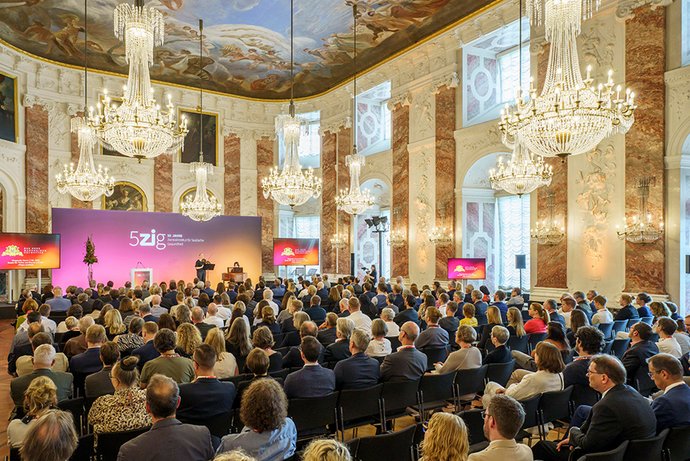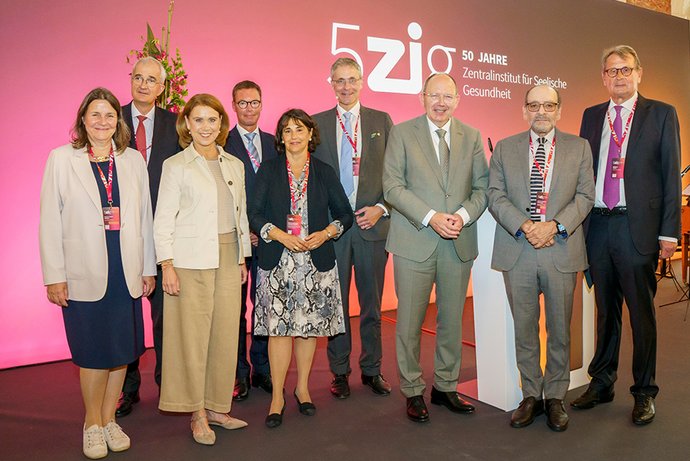Founded in 1975 as a model institute for psychiatric care and research, the Central Institute was intended to demonstrate in practice how modern, local care for mentally ill people should be organized and how modern psychiatric research can contribute to improving treatment options. Keynote speaker Professor Dr. Peter Falkai, Director of the Department of Psychiatry and Psychotherapy at Ludwig-Maximilians-Universität and Medical Director of the Max Planck Institute of Psychiatry in Munich, traced an arc from the reform efforts of the 1960s and 1970s to the present day. He also highlighted the decisive role played by Prof. Heinz Häfner in the founding of the CIMH and traced its development into a multi-professional institute that is a leader in research, teaching and patient care. "The CIMH has played a decisive role in shaping the development of psychiatric-psychotherapeutic research and patient care in Germany. And it will continue to play a key role in the future in improving the prevention and treatment of mental illness on the basis of innovative research services," summarized Falkai.
An excellently networked research center
Science Minister Petra Olschowski praised the outstanding achievements of the CIMH: "The Central Institute of Mental Health has stood for excellent work in research, teaching and patient care for five decades. In psychiatric research, the Institute is one of the leading institutions in Europe. And Baden-Württemberg also benefits as a healthcare location: CIMH researchers contribute their expertise in particular to our Health + Life Science Alliance innovation campus. This is where university and non-university institutions in the Rhine-Neckar region pool their expertise in the life and health sciences. These research results also flow into the further improvement of patient care. In the heart of Mannheim, the Central Institute of Mental Health has been helping to destigmatize mental illness and integrate patients into society for 50 years. I would like to express my appreciation and thanks to all employees of the CIMH, who are committed to research, teaching and patient care every day. I would like to congratulate them on their 50th anniversary."
A visionary decision brought the CIMH to Mannheim
This is where Mannheim's Lord Mayor Christian Specht came in. “It was a visionary decision by the then Mayor of Social Affairs, Dr. Hans Martini, and the then Lord Mayor, Dr. Hans Reschke, to bring the CIMH to Mannheim as a model institute and to provide a site in the middle of the city,” said Specht. The decision in favor of the city center was in line with the reform psychiatric concept: mentally ill people should receive help where they live.
The continuous expansion of the CIMH proves that this fruitful development continues to this day. The current new building in J 4 also offers new perspectives: there is even more space for treatment and teaching. At the same time, the neighborhood in Westliche Unterstadt will be enhanced by a newly designed forecourt and 50 new trees on the CIMH campus. Once the new building is completed, the CIMH will provide full medical care for the population of Mannheim. "The CIMH is the core of a close-knit support network for mentally ill people in our city. Networking with non-clinical services and institutions for mentally ill people is of great importance for the citizens of Mannheim," emphasized Specht. Like Olschowski, Specht also thanked the Management Board and the more than 1,700 employees of the Central Institute for their daily commitment.
Close ties with Heidelberg University
The long and successful connection between the CIMH and Heidelberg University was highlighted by the Rector of the University, Prof. Dr. Frauke Melchior. “The strong cooperation between the CIMH and Heidelberg University through joint appointments, joint scientific projects and, in particular, the Heidelberg-Mannheim Health + Life Science Alliance has led to successes in research, teaching and transfer that have had an impact far beyond the Rhine-Neckar metropolitan region,” Melchior emphasized. Currently, three Collaborative Research Centers funded by the German Research Foundation form scientific bridges between Heidelberg University and the CIMH. The scientists involved are investigating the causes of chronic pain, control mechanisms in addictive disorders and the biological basis of aggression in mental illness, among other things.
Perspectives that give hope
The variety of topics that neuroscientific research at the CIMH is dealing with today becomes clear in a magazine that the Central Institute has published to mark its anniversary. As broad as the range of topics is and as deep as the research in the individual areas goes into the biological basis of mental illness, the aim is always to gain a better understanding of the causes of mental illness and which factors influence the risk of falling ill, but also the ability to remain mentally healthy. "What we want to achieve is precision medicine, personalized medicine. Every person with a mental illness should receive the best possible individual treatment," said Prof. Dr. Andreas Meyer-Lindenberg, CEO of the CIMH, formulating the goal of all efforts. Today, more than ever before, modern technologies such as smartphones, machine learning and artificial intelligence are helping to collect and analyze insightful data. He describes a perspective that gives us hope: “In the coming years, we will gain fundamentally new insights and significantly improve the treatment of mentally ill people and mental health as a whole.”
Sponsors accelerate progress
In addition to the research funds raised and funding from the Ministry of Science and the Ministry of Social Affairs of the state of Baden-Württemberg, the CIMH repeatedly receives generous support from foundations and philanthropic donors in order to advance particularly complex and innovative projects in research and patient care. The Commercial Director of the CIMH, Andreas-W. Möller, thanked all of the Institute's supporters: “It is only with the help of these donations that we are able to implement certain pioneering projects.” Möller cited the Hector Institute for Translational Brain Research, the Hector Institute for Artificial Intelligence in Psychiatry and the recently acquired 7 Tesla magnetic resonance tomograph as examples. Among other things, he emphasized the commitment of the foundations of Hans-Werner and Josephine Hector, the Klaus Tschira Foundation, the Beisheim Foundation and the Dietmar Hopp Foundation. Möller also thanked the members of the Friends of the Central Institute for their valuable guidance and support.
Heinrich Lanz Prize for translational research in psychiatry awarded
As part of the ceremony, the Heinrich Lanz Foundation awarded the new Heinrich Lanz Prize for Translational Research in Medicine. The prize honors internationally renowned researchers who have made a special contribution to the combination of basic research and clinical application. This year's prize was awarded in the field of mental health.
The US psychiatrist and neuroscientist Professor Dr. Daniel R. Weinberger received the highly endowed prize of 100,000 euros. Weinberger has significantly shaped research into schizophrenia and other mental illnesses. He was one of the first to recognize the role of deviant brain development as a risk factor for psychiatric disorders and bring it into the focus of research. In doing so, he used innovative imaging techniques such as magnetic resonance imaging. Weinberger also developed one of the first high-precision animal models of schizophrenia and was able to show how genetic variations influence cognitive functions and brain functions in humans.
"What particularly distinguishes Professor Weinberger is his ability to transfer findings from clinical work to basic research. His life's work has contributed to the development of new diagnostic and therapeutic approaches, thereby improving the lives of many people with mental illness in the long term," said Wolfgang Pföhler, Chairman of the Heinrich Lanz Foundation, at the award ceremony.
Scientific symposium with renowned international experts
In addition to the ceremony, a scientific symposium was also held in Mannheim Palace in the afternoon. In addition to Daniel R. Weinberger, other internationally renowned experts spoke on the latest developments and issues in neuropsychiatric research.
More about the history of the CIMH at www.zi-mannheim.de/50-jahre



